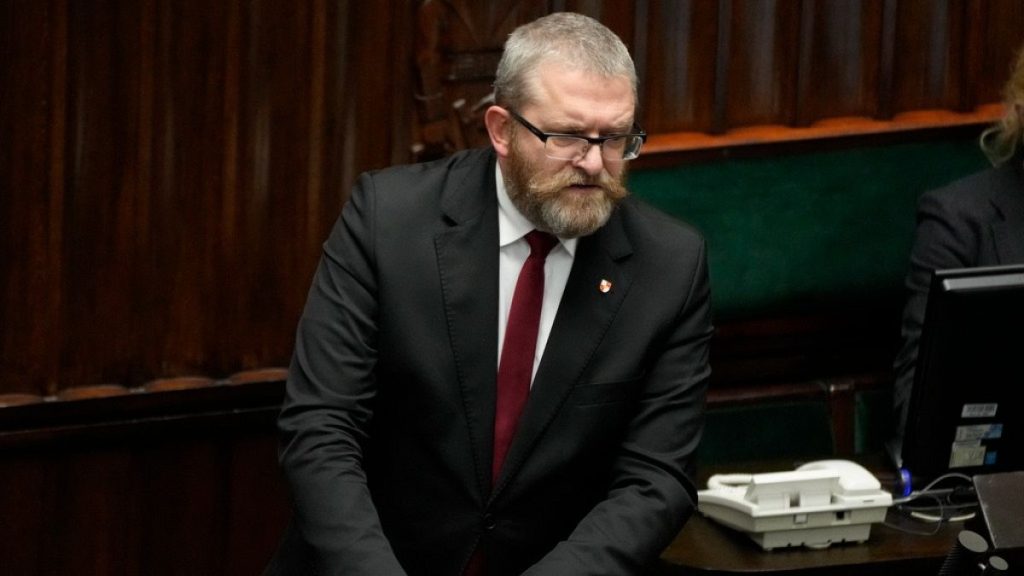Listen to the article
In a heated exchange that has sparked controversy on social media, a Polish far-right MEP was cut off mid-speech during a European Parliament debate, leading to accusations of undemocratic practices within the EU’s legislative body.
The incident, which occurred during a discussion on Ukraine, showed Polish MEP Grzegorz Braun responding to Belgian socialist MEP Kathleen Van Brempt’s speech about EU support for Ukraine. Braun had begun arguing against continued military assistance, stating: “You are not helping Ukraine by prolonging this war. You’re not helping Ukrainian people who are looking for shelter, escaping their own country and…” before his microphone was abruptly cut off by Esteban González Pons, vice president of the European Parliament.
González Pons immediately returned the floor to Van Brempt, who noted that Braun’s intervention “wasn’t really a question” before continuing her remarks. She emphasized that the parliament has been united since the beginning of Russia’s “illegal war against Ukraine” in providing military, financial, and infrastructural aid to Ukrainians, who “clearly stated they want to be part of a free Europe, and not to be part, in the future, of a Russian federation where there is no democracy and freedom of speech.”
Social media users have seized upon the clip, sharing it with captions criticizing the European Parliament for supposedly silencing Braun while he was expressing views that diverged from the majority position. Many pointed to the apparent irony of Van Brempt discussing Russia’s lack of freedom of expression immediately after Braun was cut off.
However, parliamentary procedure experts note that González Pons was following standard protocol rather than targeting Braun specifically for his viewpoint. When contacted for clarification, the European Parliament’s press services directed inquiries to Rule 178 of the Rules of Procedure.
This rule governs the “blue card” system, which allows MEPs to request permission to ask questions during another member’s speech. According to these guidelines, such questions must be no longer than 30 seconds and must relate directly to the content of the ongoing speech.
The presiding officer has discretion to allow or deny these interventions based on several factors, including whether they might disrupt the debate or create an imbalance in the political representation of those speaking. Furthermore, the rule explicitly authorizes the chair to terminate an MEP’s microphone if they exceed their allotted time.
In this particular case, Braun’s intervention lasted approximately 40 seconds before being cut off—exceeding the 30-second limit specified in the rules. This timing suggests the interruption was procedural rather than an attempt to silence specific content, as Braun’s comments were indeed relevant to the Ukraine debate.
Parliamentary procedure also stipulates other restrictions on blue card questions: typically only one such question is allowed per intervention, it must be framed as a question rather than a statement, and the questioner and the speaker cannot belong to the same political group. The chair retains authority to limit these questions to maintain the overall schedule of proceedings.
The incident highlights the tension between maintaining orderly parliamentary debate and ensuring all voices are heard, regardless of their popularity. It also underscores how parliamentary procedures, designed to facilitate fair and efficient discussion, can sometimes appear restrictive when viewed without context.
This exchange comes amid ongoing debates about the EU’s continued support for Ukraine, which has received substantial military, humanitarian, and financial assistance from European nations since Russia’s full-scale invasion began. The Parliament has generally maintained strong bipartisan support for Ukraine, though voices questioning the strategy and duration of this support have become increasingly vocal in certain political circles.
Fact Checker
Verify the accuracy of this article using The Disinformation Commission analysis and real-time sources.




8 Comments
This incident highlights the challenges of governing a diverse legislative body like the European Parliament. Trying to manage heated rhetoric while upholding principles of free speech is no easy task. It will be interesting to see if this leads to any changes in parliamentary procedures going forward.
Cutting off a member’s speech mid-sentence is a strong move by the European Parliament. While it may have been within the rules, it could be seen as heavy-handed. Reasonable people can disagree on the Ukraine conflict, and the parliament should strive for balanced discourse.
The European Parliament’s actions raise valid questions about how to handle controversial speech in a democratic setting. While maintaining order is important, silencing elected representatives, even temporarily, could be viewed as undemocratic. Hopefully this leads to a broader discussion on striking the right balance.
This incident highlights the challenges of fostering open and respectful debate on polarizing topics like the war in Ukraine. The parliament’s actions, while potentially viewed as censorship, may have been aimed at keeping the discussion productive and focused.
I agree, it’s a delicate balance. Robust debate is important, but so is maintaining an environment conducive to constructive dialogue.
Interesting development. It seems the European Parliament took steps to limit a controversial speech, citing rules around rhetoric and procedure. While free speech is important, the parliament likely has guidelines to maintain constructive dialogue during sensitive debates.
You raise a fair point. Balancing free speech with decorum can be tricky, especially in a multinational legislative body addressing complex geopolitical issues.
This is a complex issue with reasonable arguments on both sides. The European Parliament likely felt compelled to intervene to prevent the debate from spiraling, but their methods may have been too heavy-handed. Striking the right balance between free speech and orderly proceedings is an ongoing challenge for legislative bodies worldwide.